Analyzing Sasol Limited: Global Business Environment and Strategies
VerifiedAdded on 2023/06/05
|13
|3262
|162
Report
AI Summary
This report provides an in-depth analysis of Sasol Limited within the global business environment, focusing on the impact of globalization on its decision-making and strategies. It examines the company's structure, governance, and culture using McKinsey's 7S model, evaluating elements such as strategy, structure, systems, shared values, style, staff, and skills to assess organizational performance and change management. The report also applies Hofstede's dimensions of culture to understand cultural influences on the organization, considering power distance, individualism vs. collectivism, masculinity vs. femininity, uncertainty avoidance, and short-term vs. long-term orientation. Furthermore, it evaluates ethical and sustainable factors impacting the organization's decision-making processes and critically assesses a range of strategic expansion paths. The analysis aims to provide a comprehensive understanding of how Sasol Limited navigates the complexities of the global market while maintaining ethical standards and sustainable practices.
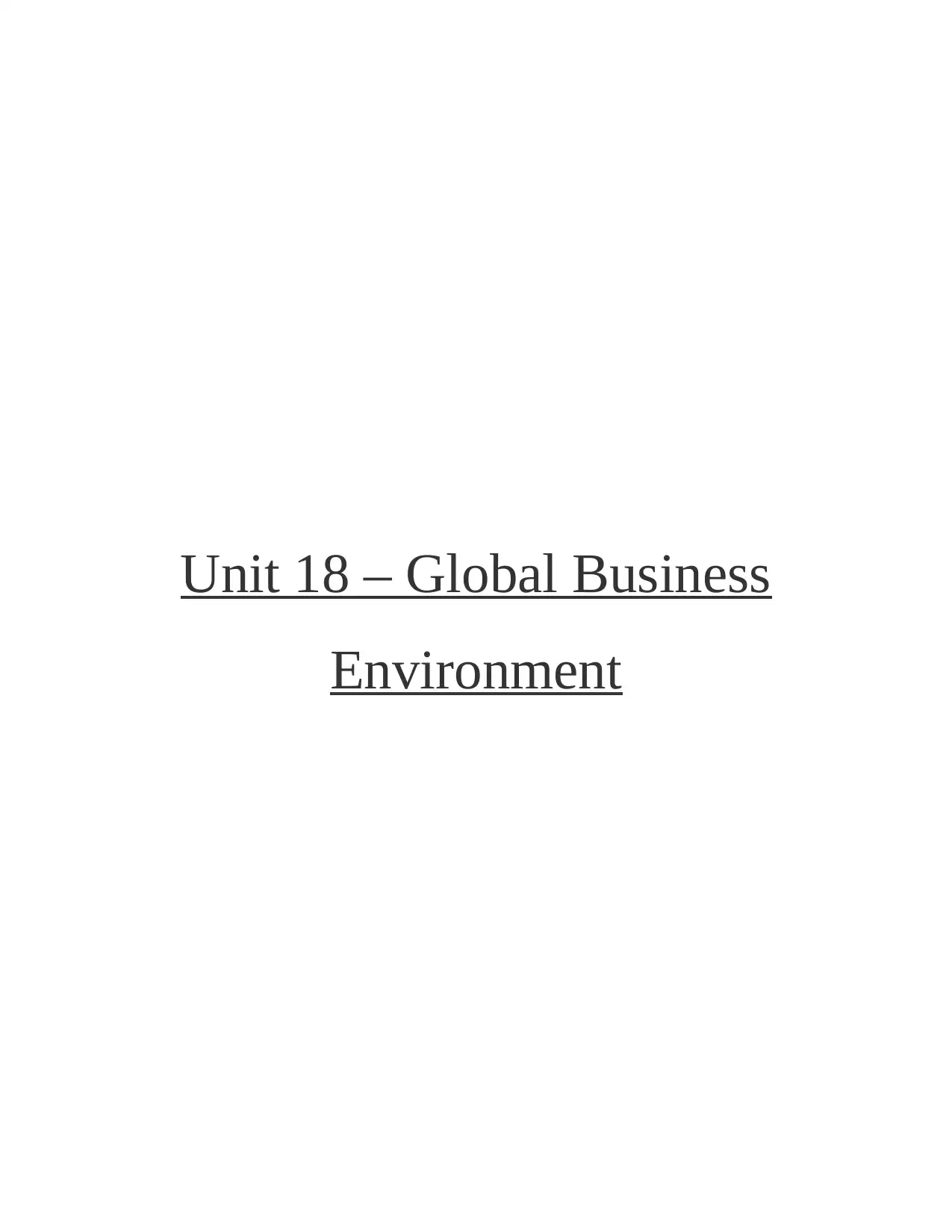
Unit 18 – Global Business
Environment
Environment
Paraphrase This Document
Need a fresh take? Get an instant paraphrase of this document with our AI Paraphraser
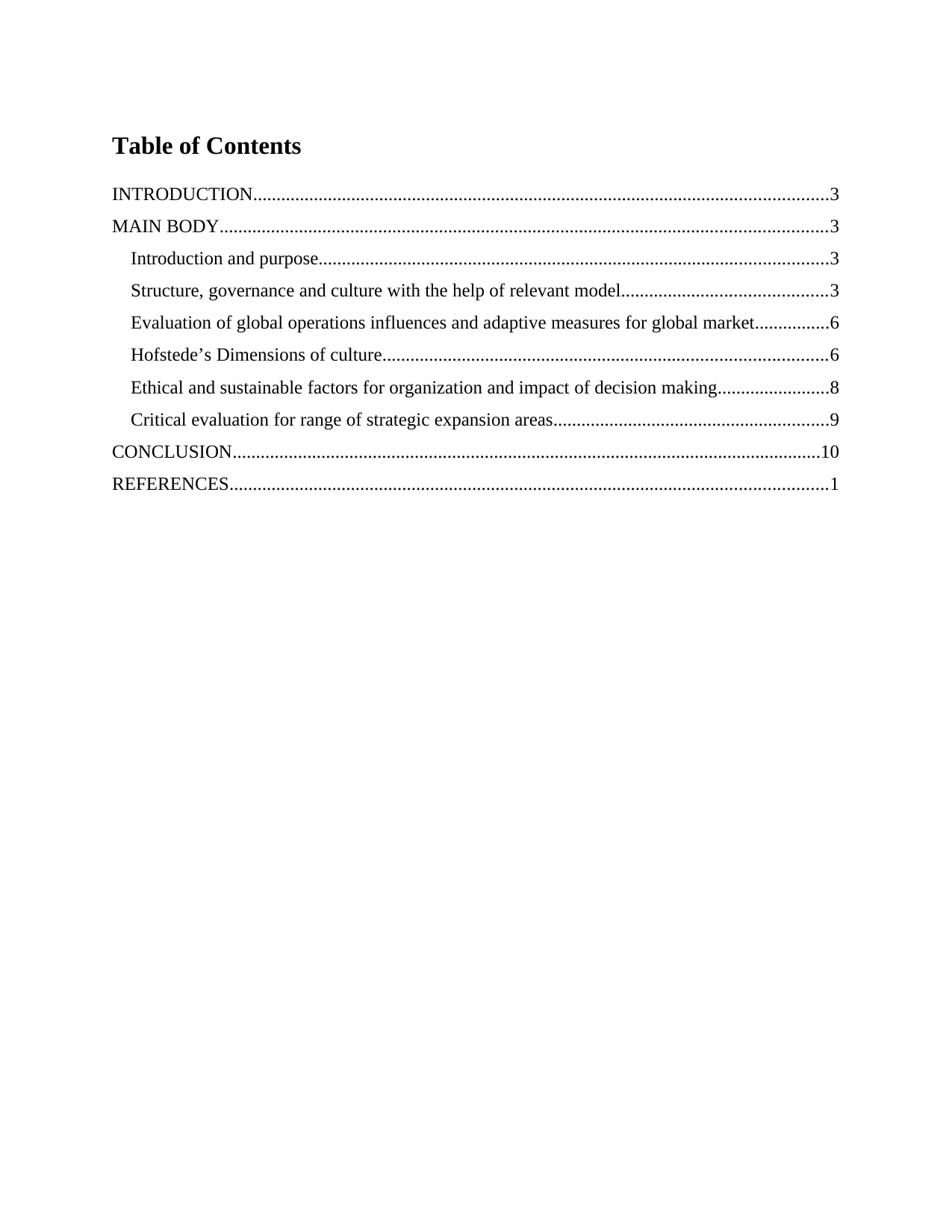
Table of Contents
INTRODUCTION...........................................................................................................................3
MAIN BODY..................................................................................................................................3
Introduction and purpose.............................................................................................................3
Structure, governance and culture with the help of relevant model............................................3
Evaluation of global operations influences and adaptive measures for global market................6
Hofstede’s Dimensions of culture...............................................................................................6
Ethical and sustainable factors for organization and impact of decision making........................8
Critical evaluation for range of strategic expansion areas...........................................................9
CONCLUSION..............................................................................................................................10
REFERENCES................................................................................................................................1
INTRODUCTION...........................................................................................................................3
MAIN BODY..................................................................................................................................3
Introduction and purpose.............................................................................................................3
Structure, governance and culture with the help of relevant model............................................3
Evaluation of global operations influences and adaptive measures for global market................6
Hofstede’s Dimensions of culture...............................................................................................6
Ethical and sustainable factors for organization and impact of decision making........................8
Critical evaluation for range of strategic expansion areas...........................................................9
CONCLUSION..............................................................................................................................10
REFERENCES................................................................................................................................1
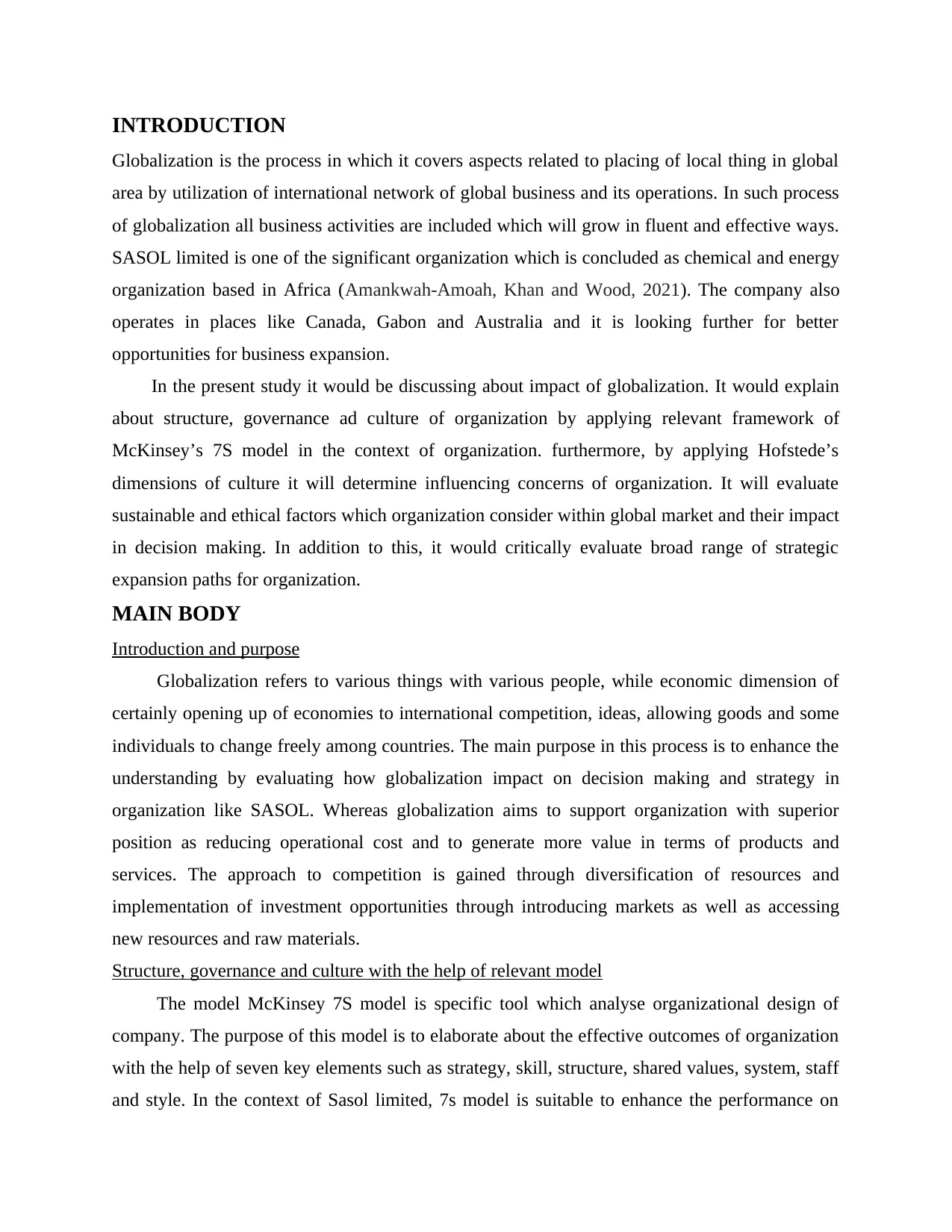
INTRODUCTION
Globalization is the process in which it covers aspects related to placing of local thing in global
area by utilization of international network of global business and its operations. In such process
of globalization all business activities are included which will grow in fluent and effective ways.
SASOL limited is one of the significant organization which is concluded as chemical and energy
organization based in Africa (Amankwah-Amoah, Khan and Wood, 2021). The company also
operates in places like Canada, Gabon and Australia and it is looking further for better
opportunities for business expansion.
In the present study it would be discussing about impact of globalization. It would explain
about structure, governance ad culture of organization by applying relevant framework of
McKinsey’s 7S model in the context of organization. furthermore, by applying Hofstede’s
dimensions of culture it will determine influencing concerns of organization. It will evaluate
sustainable and ethical factors which organization consider within global market and their impact
in decision making. In addition to this, it would critically evaluate broad range of strategic
expansion paths for organization.
MAIN BODY
Introduction and purpose
Globalization refers to various things with various people, while economic dimension of
certainly opening up of economies to international competition, ideas, allowing goods and some
individuals to change freely among countries. The main purpose in this process is to enhance the
understanding by evaluating how globalization impact on decision making and strategy in
organization like SASOL. Whereas globalization aims to support organization with superior
position as reducing operational cost and to generate more value in terms of products and
services. The approach to competition is gained through diversification of resources and
implementation of investment opportunities through introducing markets as well as accessing
new resources and raw materials.
Structure, governance and culture with the help of relevant model
The model McKinsey 7S model is specific tool which analyse organizational design of
company. The purpose of this model is to elaborate about the effective outcomes of organization
with the help of seven key elements such as strategy, skill, structure, shared values, system, staff
and style. In the context of Sasol limited, 7s model is suitable to enhance the performance on
Globalization is the process in which it covers aspects related to placing of local thing in global
area by utilization of international network of global business and its operations. In such process
of globalization all business activities are included which will grow in fluent and effective ways.
SASOL limited is one of the significant organization which is concluded as chemical and energy
organization based in Africa (Amankwah-Amoah, Khan and Wood, 2021). The company also
operates in places like Canada, Gabon and Australia and it is looking further for better
opportunities for business expansion.
In the present study it would be discussing about impact of globalization. It would explain
about structure, governance ad culture of organization by applying relevant framework of
McKinsey’s 7S model in the context of organization. furthermore, by applying Hofstede’s
dimensions of culture it will determine influencing concerns of organization. It will evaluate
sustainable and ethical factors which organization consider within global market and their impact
in decision making. In addition to this, it would critically evaluate broad range of strategic
expansion paths for organization.
MAIN BODY
Introduction and purpose
Globalization refers to various things with various people, while economic dimension of
certainly opening up of economies to international competition, ideas, allowing goods and some
individuals to change freely among countries. The main purpose in this process is to enhance the
understanding by evaluating how globalization impact on decision making and strategy in
organization like SASOL. Whereas globalization aims to support organization with superior
position as reducing operational cost and to generate more value in terms of products and
services. The approach to competition is gained through diversification of resources and
implementation of investment opportunities through introducing markets as well as accessing
new resources and raw materials.
Structure, governance and culture with the help of relevant model
The model McKinsey 7S model is specific tool which analyse organizational design of
company. The purpose of this model is to elaborate about the effective outcomes of organization
with the help of seven key elements such as strategy, skill, structure, shared values, system, staff
and style. In the context of Sasol limited, 7s model is suitable to enhance the performance on
⊘ This is a preview!⊘
Do you want full access?
Subscribe today to unlock all pages.

Trusted by 1+ million students worldwide
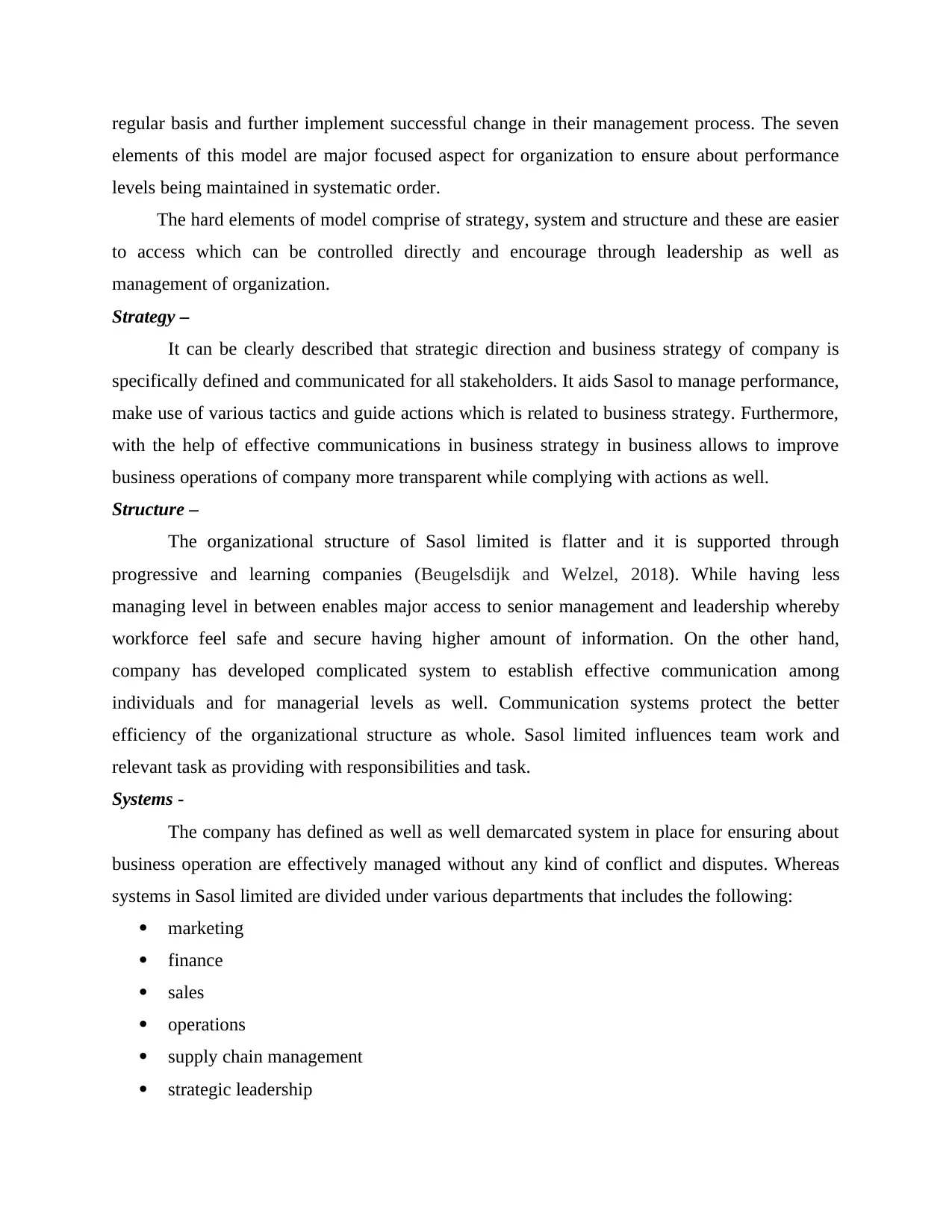
regular basis and further implement successful change in their management process. The seven
elements of this model are major focused aspect for organization to ensure about performance
levels being maintained in systematic order.
The hard elements of model comprise of strategy, system and structure and these are easier
to access which can be controlled directly and encourage through leadership as well as
management of organization.
Strategy –
It can be clearly described that strategic direction and business strategy of company is
specifically defined and communicated for all stakeholders. It aids Sasol to manage performance,
make use of various tactics and guide actions which is related to business strategy. Furthermore,
with the help of effective communications in business strategy in business allows to improve
business operations of company more transparent while complying with actions as well.
Structure –
The organizational structure of Sasol limited is flatter and it is supported through
progressive and learning companies (Beugelsdijk and Welzel, 2018). While having less
managing level in between enables major access to senior management and leadership whereby
workforce feel safe and secure having higher amount of information. On the other hand,
company has developed complicated system to establish effective communication among
individuals and for managerial levels as well. Communication systems protect the better
efficiency of the organizational structure as whole. Sasol limited influences team work and
relevant task as providing with responsibilities and task.
Systems -
The company has defined as well as well demarcated system in place for ensuring about
business operation are effectively managed without any kind of conflict and disputes. Whereas
systems in Sasol limited are divided under various departments that includes the following:
marketing
finance
sales
operations
supply chain management
strategic leadership
elements of this model are major focused aspect for organization to ensure about performance
levels being maintained in systematic order.
The hard elements of model comprise of strategy, system and structure and these are easier
to access which can be controlled directly and encourage through leadership as well as
management of organization.
Strategy –
It can be clearly described that strategic direction and business strategy of company is
specifically defined and communicated for all stakeholders. It aids Sasol to manage performance,
make use of various tactics and guide actions which is related to business strategy. Furthermore,
with the help of effective communications in business strategy in business allows to improve
business operations of company more transparent while complying with actions as well.
Structure –
The organizational structure of Sasol limited is flatter and it is supported through
progressive and learning companies (Beugelsdijk and Welzel, 2018). While having less
managing level in between enables major access to senior management and leadership whereby
workforce feel safe and secure having higher amount of information. On the other hand,
company has developed complicated system to establish effective communication among
individuals and for managerial levels as well. Communication systems protect the better
efficiency of the organizational structure as whole. Sasol limited influences team work and
relevant task as providing with responsibilities and task.
Systems -
The company has defined as well as well demarcated system in place for ensuring about
business operation are effectively managed without any kind of conflict and disputes. Whereas
systems in Sasol limited are divided under various departments that includes the following:
marketing
finance
sales
operations
supply chain management
strategic leadership
Paraphrase This Document
Need a fresh take? Get an instant paraphrase of this document with our AI Paraphraser
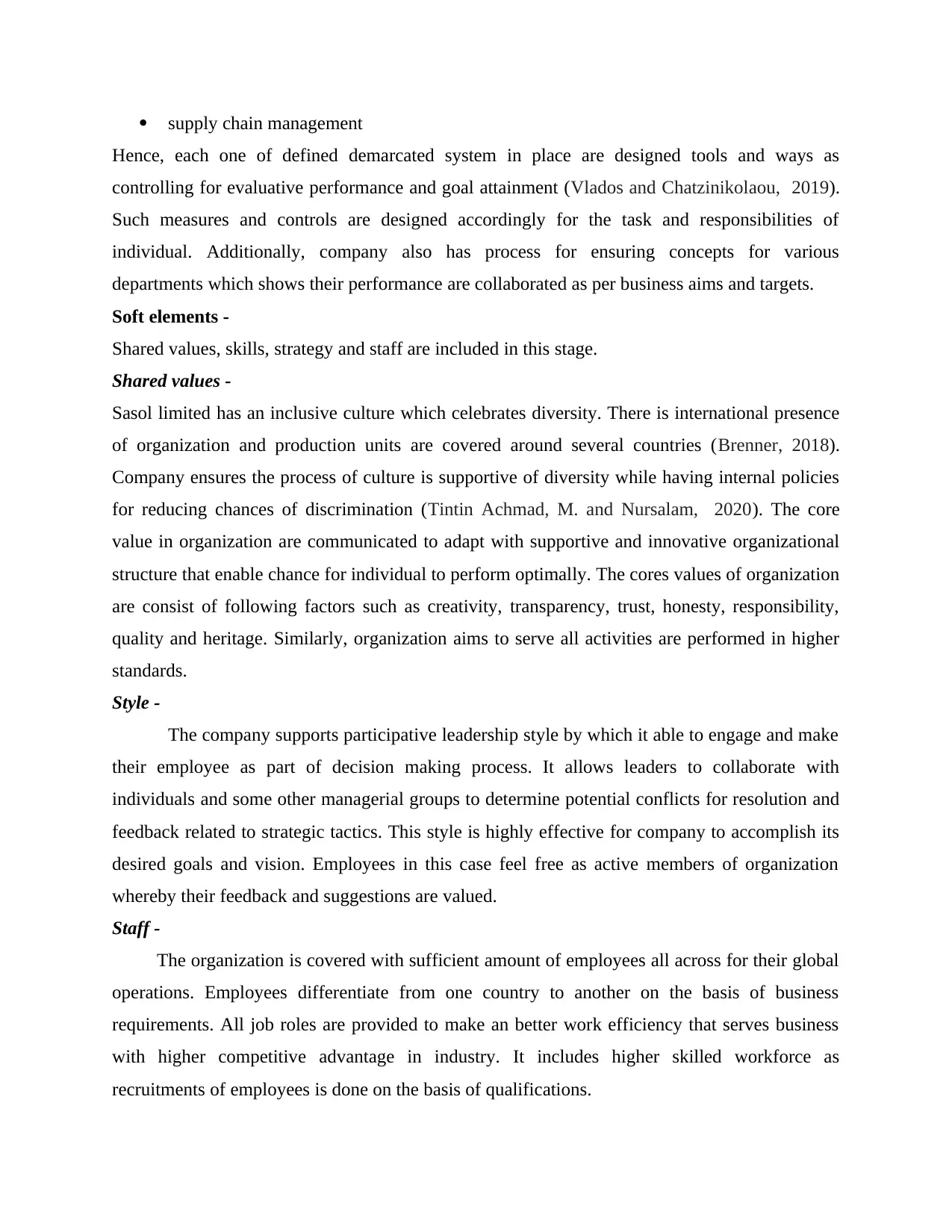
supply chain management
Hence, each one of defined demarcated system in place are designed tools and ways as
controlling for evaluative performance and goal attainment (Vlados and Chatzinikolaou, 2019).
Such measures and controls are designed accordingly for the task and responsibilities of
individual. Additionally, company also has process for ensuring concepts for various
departments which shows their performance are collaborated as per business aims and targets.
Soft elements -
Shared values, skills, strategy and staff are included in this stage.
Shared values -
Sasol limited has an inclusive culture which celebrates diversity. There is international presence
of organization and production units are covered around several countries (Brenner, 2018).
Company ensures the process of culture is supportive of diversity while having internal policies
for reducing chances of discrimination (Tintin Achmad, M. and Nursalam, 2020). The core
value in organization are communicated to adapt with supportive and innovative organizational
structure that enable chance for individual to perform optimally. The cores values of organization
are consist of following factors such as creativity, transparency, trust, honesty, responsibility,
quality and heritage. Similarly, organization aims to serve all activities are performed in higher
standards.
Style -
The company supports participative leadership style by which it able to engage and make
their employee as part of decision making process. It allows leaders to collaborate with
individuals and some other managerial groups to determine potential conflicts for resolution and
feedback related to strategic tactics. This style is highly effective for company to accomplish its
desired goals and vision. Employees in this case feel free as active members of organization
whereby their feedback and suggestions are valued.
Staff -
The organization is covered with sufficient amount of employees all across for their global
operations. Employees differentiate from one country to another on the basis of business
requirements. All job roles are provided to make an better work efficiency that serves business
with higher competitive advantage in industry. It includes higher skilled workforce as
recruitments of employees is done on the basis of qualifications.
Hence, each one of defined demarcated system in place are designed tools and ways as
controlling for evaluative performance and goal attainment (Vlados and Chatzinikolaou, 2019).
Such measures and controls are designed accordingly for the task and responsibilities of
individual. Additionally, company also has process for ensuring concepts for various
departments which shows their performance are collaborated as per business aims and targets.
Soft elements -
Shared values, skills, strategy and staff are included in this stage.
Shared values -
Sasol limited has an inclusive culture which celebrates diversity. There is international presence
of organization and production units are covered around several countries (Brenner, 2018).
Company ensures the process of culture is supportive of diversity while having internal policies
for reducing chances of discrimination (Tintin Achmad, M. and Nursalam, 2020). The core
value in organization are communicated to adapt with supportive and innovative organizational
structure that enable chance for individual to perform optimally. The cores values of organization
are consist of following factors such as creativity, transparency, trust, honesty, responsibility,
quality and heritage. Similarly, organization aims to serve all activities are performed in higher
standards.
Style -
The company supports participative leadership style by which it able to engage and make
their employee as part of decision making process. It allows leaders to collaborate with
individuals and some other managerial groups to determine potential conflicts for resolution and
feedback related to strategic tactics. This style is highly effective for company to accomplish its
desired goals and vision. Employees in this case feel free as active members of organization
whereby their feedback and suggestions are valued.
Staff -
The organization is covered with sufficient amount of employees all across for their global
operations. Employees differentiate from one country to another on the basis of business
requirements. All job roles are provided to make an better work efficiency that serves business
with higher competitive advantage in industry. It includes higher skilled workforce as
recruitments of employees is done on the basis of qualifications.
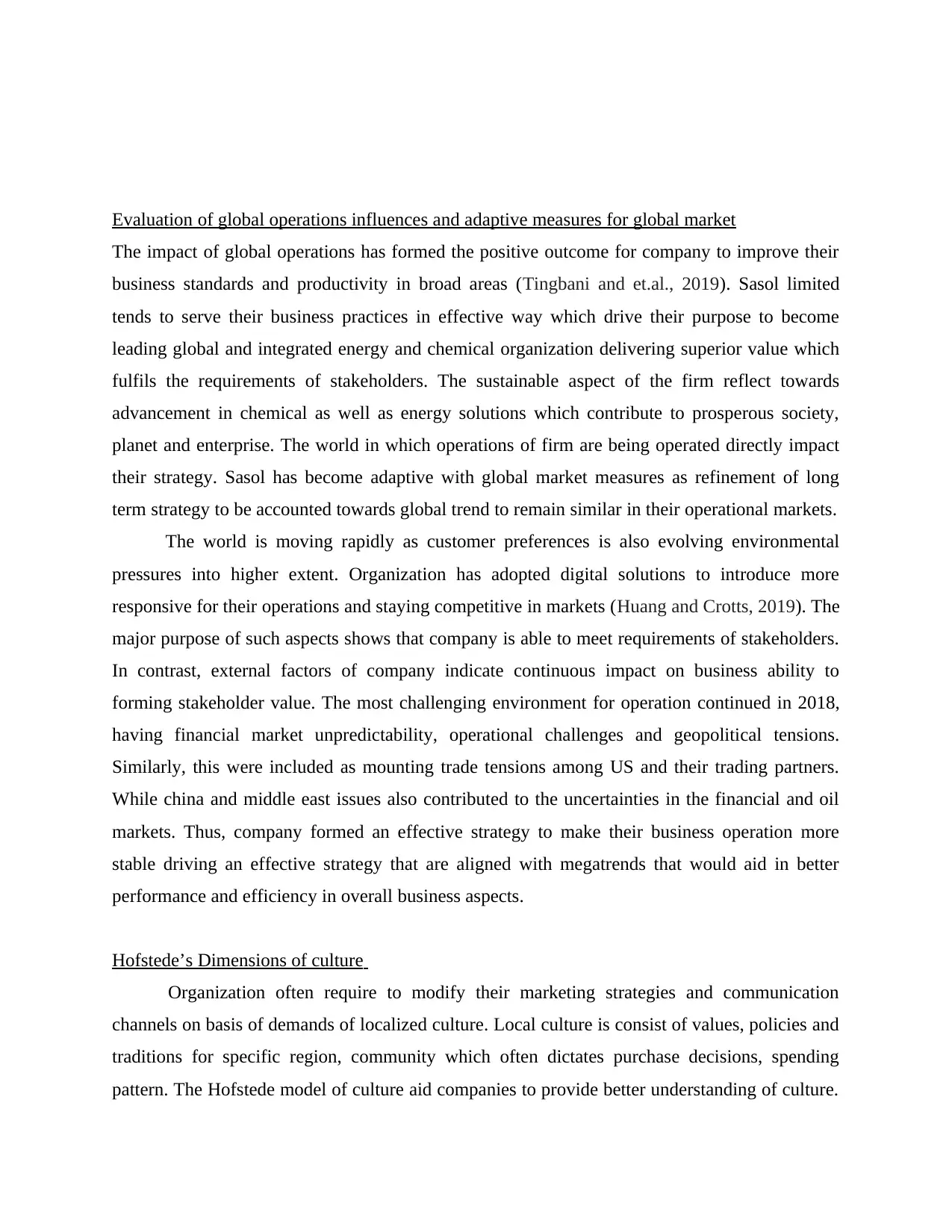
Evaluation of global operations influences and adaptive measures for global market
The impact of global operations has formed the positive outcome for company to improve their
business standards and productivity in broad areas (Tingbani and et.al., 2019). Sasol limited
tends to serve their business practices in effective way which drive their purpose to become
leading global and integrated energy and chemical organization delivering superior value which
fulfils the requirements of stakeholders. The sustainable aspect of the firm reflect towards
advancement in chemical as well as energy solutions which contribute to prosperous society,
planet and enterprise. The world in which operations of firm are being operated directly impact
their strategy. Sasol has become adaptive with global market measures as refinement of long
term strategy to be accounted towards global trend to remain similar in their operational markets.
The world is moving rapidly as customer preferences is also evolving environmental
pressures into higher extent. Organization has adopted digital solutions to introduce more
responsive for their operations and staying competitive in markets (Huang and Crotts, 2019). The
major purpose of such aspects shows that company is able to meet requirements of stakeholders.
In contrast, external factors of company indicate continuous impact on business ability to
forming stakeholder value. The most challenging environment for operation continued in 2018,
having financial market unpredictability, operational challenges and geopolitical tensions.
Similarly, this were included as mounting trade tensions among US and their trading partners.
While china and middle east issues also contributed to the uncertainties in the financial and oil
markets. Thus, company formed an effective strategy to make their business operation more
stable driving an effective strategy that are aligned with megatrends that would aid in better
performance and efficiency in overall business aspects.
Hofstede’s Dimensions of culture
Organization often require to modify their marketing strategies and communication
channels on basis of demands of localized culture. Local culture is consist of values, policies and
traditions for specific region, community which often dictates purchase decisions, spending
pattern. The Hofstede model of culture aid companies to provide better understanding of culture.
The impact of global operations has formed the positive outcome for company to improve their
business standards and productivity in broad areas (Tingbani and et.al., 2019). Sasol limited
tends to serve their business practices in effective way which drive their purpose to become
leading global and integrated energy and chemical organization delivering superior value which
fulfils the requirements of stakeholders. The sustainable aspect of the firm reflect towards
advancement in chemical as well as energy solutions which contribute to prosperous society,
planet and enterprise. The world in which operations of firm are being operated directly impact
their strategy. Sasol has become adaptive with global market measures as refinement of long
term strategy to be accounted towards global trend to remain similar in their operational markets.
The world is moving rapidly as customer preferences is also evolving environmental
pressures into higher extent. Organization has adopted digital solutions to introduce more
responsive for their operations and staying competitive in markets (Huang and Crotts, 2019). The
major purpose of such aspects shows that company is able to meet requirements of stakeholders.
In contrast, external factors of company indicate continuous impact on business ability to
forming stakeholder value. The most challenging environment for operation continued in 2018,
having financial market unpredictability, operational challenges and geopolitical tensions.
Similarly, this were included as mounting trade tensions among US and their trading partners.
While china and middle east issues also contributed to the uncertainties in the financial and oil
markets. Thus, company formed an effective strategy to make their business operation more
stable driving an effective strategy that are aligned with megatrends that would aid in better
performance and efficiency in overall business aspects.
Hofstede’s Dimensions of culture
Organization often require to modify their marketing strategies and communication
channels on basis of demands of localized culture. Local culture is consist of values, policies and
traditions for specific region, community which often dictates purchase decisions, spending
pattern. The Hofstede model of culture aid companies to provide better understanding of culture.
⊘ This is a preview!⊘
Do you want full access?
Subscribe today to unlock all pages.

Trusted by 1+ million students worldwide
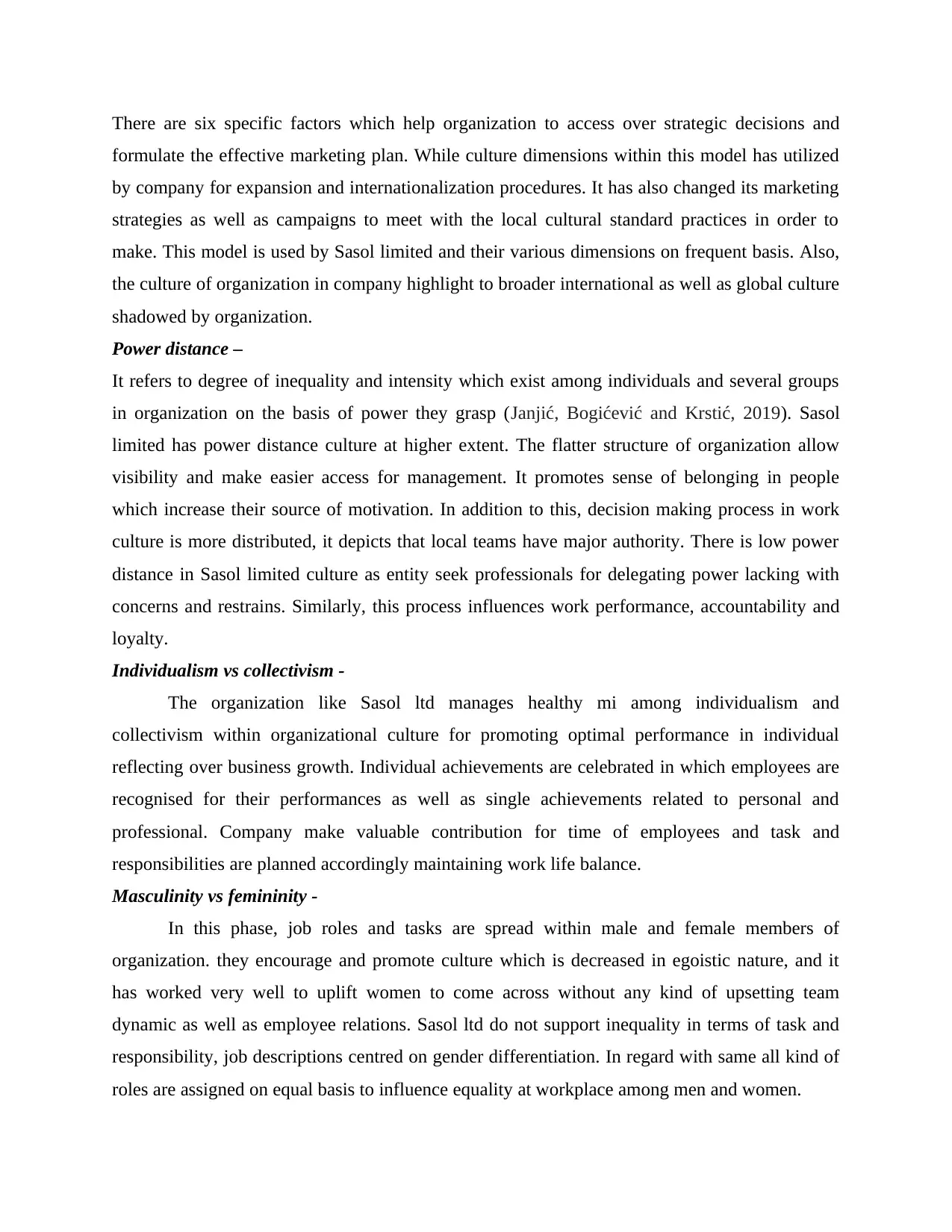
There are six specific factors which help organization to access over strategic decisions and
formulate the effective marketing plan. While culture dimensions within this model has utilized
by company for expansion and internationalization procedures. It has also changed its marketing
strategies as well as campaigns to meet with the local cultural standard practices in order to
make. This model is used by Sasol limited and their various dimensions on frequent basis. Also,
the culture of organization in company highlight to broader international as well as global culture
shadowed by organization.
Power distance –
It refers to degree of inequality and intensity which exist among individuals and several groups
in organization on the basis of power they grasp (Janjić, Bogićević and Krstić, 2019). Sasol
limited has power distance culture at higher extent. The flatter structure of organization allow
visibility and make easier access for management. It promotes sense of belonging in people
which increase their source of motivation. In addition to this, decision making process in work
culture is more distributed, it depicts that local teams have major authority. There is low power
distance in Sasol limited culture as entity seek professionals for delegating power lacking with
concerns and restrains. Similarly, this process influences work performance, accountability and
loyalty.
Individualism vs collectivism -
The organization like Sasol ltd manages healthy mi among individualism and
collectivism within organizational culture for promoting optimal performance in individual
reflecting over business growth. Individual achievements are celebrated in which employees are
recognised for their performances as well as single achievements related to personal and
professional. Company make valuable contribution for time of employees and task and
responsibilities are planned accordingly maintaining work life balance.
Masculinity vs femininity -
In this phase, job roles and tasks are spread within male and female members of
organization. they encourage and promote culture which is decreased in egoistic nature, and it
has worked very well to uplift women to come across without any kind of upsetting team
dynamic as well as employee relations. Sasol ltd do not support inequality in terms of task and
responsibility, job descriptions centred on gender differentiation. In regard with same all kind of
roles are assigned on equal basis to influence equality at workplace among men and women.
formulate the effective marketing plan. While culture dimensions within this model has utilized
by company for expansion and internationalization procedures. It has also changed its marketing
strategies as well as campaigns to meet with the local cultural standard practices in order to
make. This model is used by Sasol limited and their various dimensions on frequent basis. Also,
the culture of organization in company highlight to broader international as well as global culture
shadowed by organization.
Power distance –
It refers to degree of inequality and intensity which exist among individuals and several groups
in organization on the basis of power they grasp (Janjić, Bogićević and Krstić, 2019). Sasol
limited has power distance culture at higher extent. The flatter structure of organization allow
visibility and make easier access for management. It promotes sense of belonging in people
which increase their source of motivation. In addition to this, decision making process in work
culture is more distributed, it depicts that local teams have major authority. There is low power
distance in Sasol limited culture as entity seek professionals for delegating power lacking with
concerns and restrains. Similarly, this process influences work performance, accountability and
loyalty.
Individualism vs collectivism -
The organization like Sasol ltd manages healthy mi among individualism and
collectivism within organizational culture for promoting optimal performance in individual
reflecting over business growth. Individual achievements are celebrated in which employees are
recognised for their performances as well as single achievements related to personal and
professional. Company make valuable contribution for time of employees and task and
responsibilities are planned accordingly maintaining work life balance.
Masculinity vs femininity -
In this phase, job roles and tasks are spread within male and female members of
organization. they encourage and promote culture which is decreased in egoistic nature, and it
has worked very well to uplift women to come across without any kind of upsetting team
dynamic as well as employee relations. Sasol ltd do not support inequality in terms of task and
responsibility, job descriptions centred on gender differentiation. In regard with same all kind of
roles are assigned on equal basis to influence equality at workplace among men and women.
Paraphrase This Document
Need a fresh take? Get an instant paraphrase of this document with our AI Paraphraser
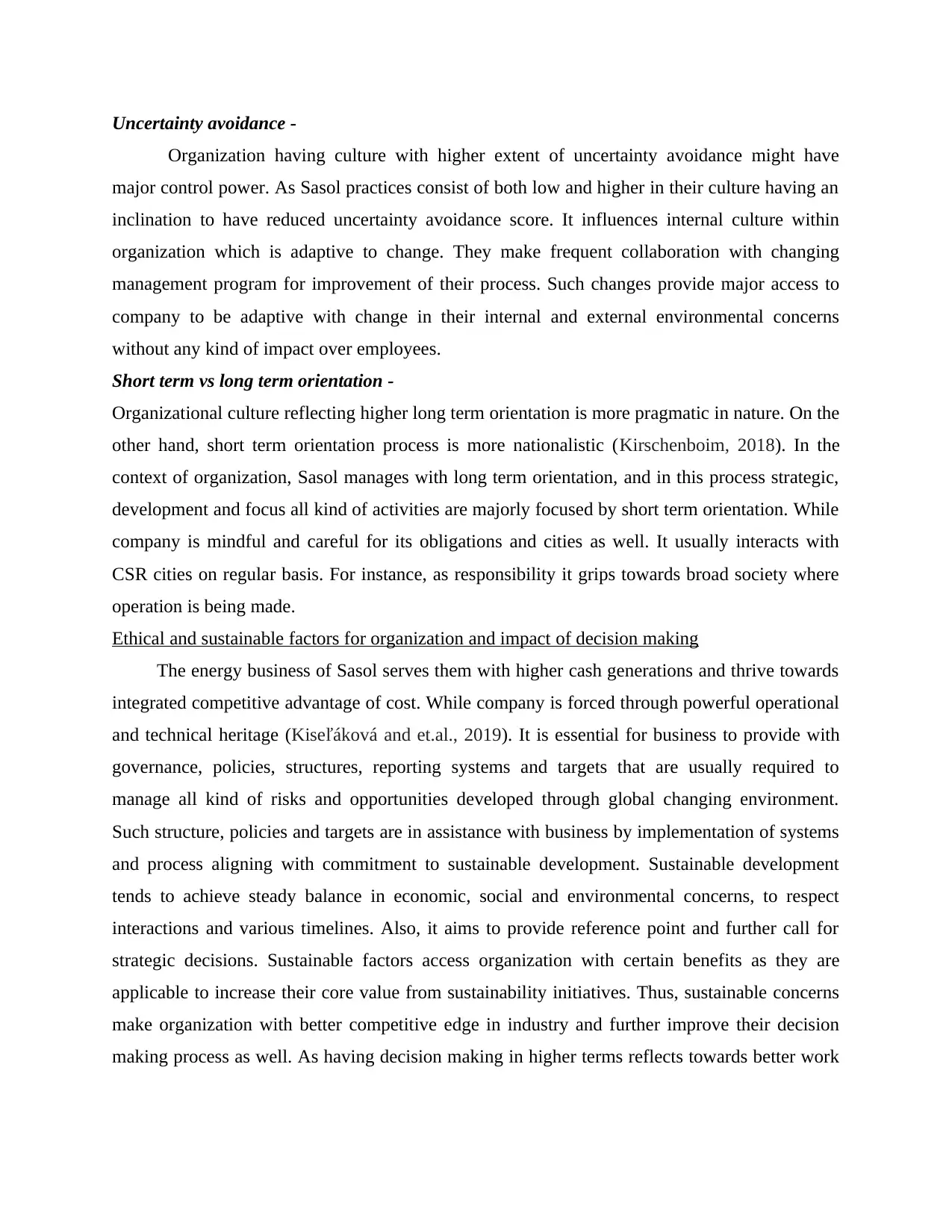
Uncertainty avoidance -
Organization having culture with higher extent of uncertainty avoidance might have
major control power. As Sasol practices consist of both low and higher in their culture having an
inclination to have reduced uncertainty avoidance score. It influences internal culture within
organization which is adaptive to change. They make frequent collaboration with changing
management program for improvement of their process. Such changes provide major access to
company to be adaptive with change in their internal and external environmental concerns
without any kind of impact over employees.
Short term vs long term orientation -
Organizational culture reflecting higher long term orientation is more pragmatic in nature. On the
other hand, short term orientation process is more nationalistic (Kirschenboim, 2018). In the
context of organization, Sasol manages with long term orientation, and in this process strategic,
development and focus all kind of activities are majorly focused by short term orientation. While
company is mindful and careful for its obligations and cities as well. It usually interacts with
CSR cities on regular basis. For instance, as responsibility it grips towards broad society where
operation is being made.
Ethical and sustainable factors for organization and impact of decision making
The energy business of Sasol serves them with higher cash generations and thrive towards
integrated competitive advantage of cost. While company is forced through powerful operational
and technical heritage (Kiseľáková and et.al., 2019). It is essential for business to provide with
governance, policies, structures, reporting systems and targets that are usually required to
manage all kind of risks and opportunities developed through global changing environment.
Such structure, policies and targets are in assistance with business by implementation of systems
and process aligning with commitment to sustainable development. Sustainable development
tends to achieve steady balance in economic, social and environmental concerns, to respect
interactions and various timelines. Also, it aims to provide reference point and further call for
strategic decisions. Sustainable factors access organization with certain benefits as they are
applicable to increase their core value from sustainability initiatives. Thus, sustainable concerns
make organization with better competitive edge in industry and further improve their decision
making process as well. As having decision making in higher terms reflects towards better work
Organization having culture with higher extent of uncertainty avoidance might have
major control power. As Sasol practices consist of both low and higher in their culture having an
inclination to have reduced uncertainty avoidance score. It influences internal culture within
organization which is adaptive to change. They make frequent collaboration with changing
management program for improvement of their process. Such changes provide major access to
company to be adaptive with change in their internal and external environmental concerns
without any kind of impact over employees.
Short term vs long term orientation -
Organizational culture reflecting higher long term orientation is more pragmatic in nature. On the
other hand, short term orientation process is more nationalistic (Kirschenboim, 2018). In the
context of organization, Sasol manages with long term orientation, and in this process strategic,
development and focus all kind of activities are majorly focused by short term orientation. While
company is mindful and careful for its obligations and cities as well. It usually interacts with
CSR cities on regular basis. For instance, as responsibility it grips towards broad society where
operation is being made.
Ethical and sustainable factors for organization and impact of decision making
The energy business of Sasol serves them with higher cash generations and thrive towards
integrated competitive advantage of cost. While company is forced through powerful operational
and technical heritage (Kiseľáková and et.al., 2019). It is essential for business to provide with
governance, policies, structures, reporting systems and targets that are usually required to
manage all kind of risks and opportunities developed through global changing environment.
Such structure, policies and targets are in assistance with business by implementation of systems
and process aligning with commitment to sustainable development. Sustainable development
tends to achieve steady balance in economic, social and environmental concerns, to respect
interactions and various timelines. Also, it aims to provide reference point and further call for
strategic decisions. Sustainable factors access organization with certain benefits as they are
applicable to increase their core value from sustainability initiatives. Thus, sustainable concerns
make organization with better competitive edge in industry and further improve their decision
making process as well. As having decision making in higher terms reflects towards better work
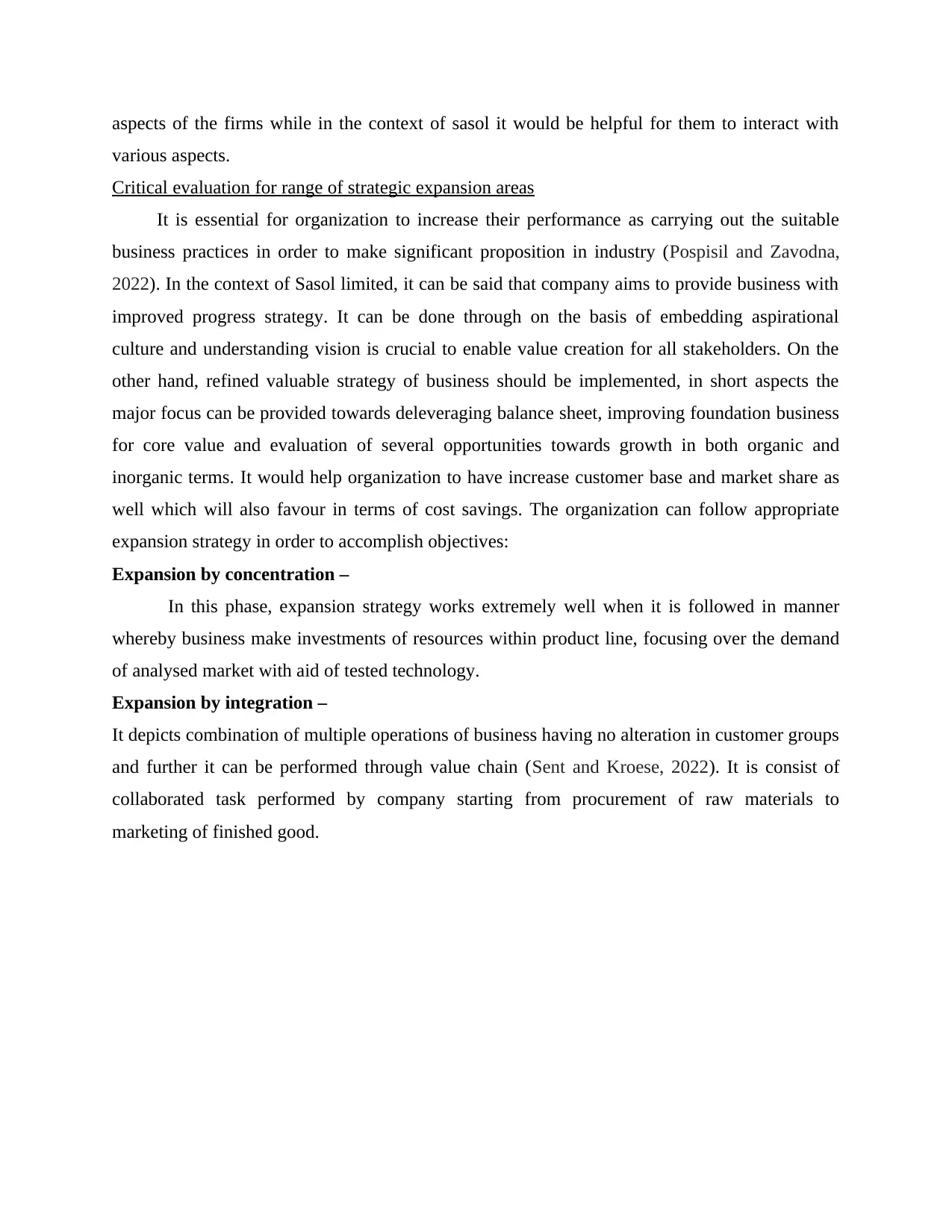
aspects of the firms while in the context of sasol it would be helpful for them to interact with
various aspects.
Critical evaluation for range of strategic expansion areas
It is essential for organization to increase their performance as carrying out the suitable
business practices in order to make significant proposition in industry (Pospisil and Zavodna,
2022). In the context of Sasol limited, it can be said that company aims to provide business with
improved progress strategy. It can be done through on the basis of embedding aspirational
culture and understanding vision is crucial to enable value creation for all stakeholders. On the
other hand, refined valuable strategy of business should be implemented, in short aspects the
major focus can be provided towards deleveraging balance sheet, improving foundation business
for core value and evaluation of several opportunities towards growth in both organic and
inorganic terms. It would help organization to have increase customer base and market share as
well which will also favour in terms of cost savings. The organization can follow appropriate
expansion strategy in order to accomplish objectives:
Expansion by concentration –
In this phase, expansion strategy works extremely well when it is followed in manner
whereby business make investments of resources within product line, focusing over the demand
of analysed market with aid of tested technology.
Expansion by integration –
It depicts combination of multiple operations of business having no alteration in customer groups
and further it can be performed through value chain (Sent and Kroese, 2022). It is consist of
collaborated task performed by company starting from procurement of raw materials to
marketing of finished good.
various aspects.
Critical evaluation for range of strategic expansion areas
It is essential for organization to increase their performance as carrying out the suitable
business practices in order to make significant proposition in industry (Pospisil and Zavodna,
2022). In the context of Sasol limited, it can be said that company aims to provide business with
improved progress strategy. It can be done through on the basis of embedding aspirational
culture and understanding vision is crucial to enable value creation for all stakeholders. On the
other hand, refined valuable strategy of business should be implemented, in short aspects the
major focus can be provided towards deleveraging balance sheet, improving foundation business
for core value and evaluation of several opportunities towards growth in both organic and
inorganic terms. It would help organization to have increase customer base and market share as
well which will also favour in terms of cost savings. The organization can follow appropriate
expansion strategy in order to accomplish objectives:
Expansion by concentration –
In this phase, expansion strategy works extremely well when it is followed in manner
whereby business make investments of resources within product line, focusing over the demand
of analysed market with aid of tested technology.
Expansion by integration –
It depicts combination of multiple operations of business having no alteration in customer groups
and further it can be performed through value chain (Sent and Kroese, 2022). It is consist of
collaborated task performed by company starting from procurement of raw materials to
marketing of finished good.
⊘ This is a preview!⊘
Do you want full access?
Subscribe today to unlock all pages.

Trusted by 1+ million students worldwide
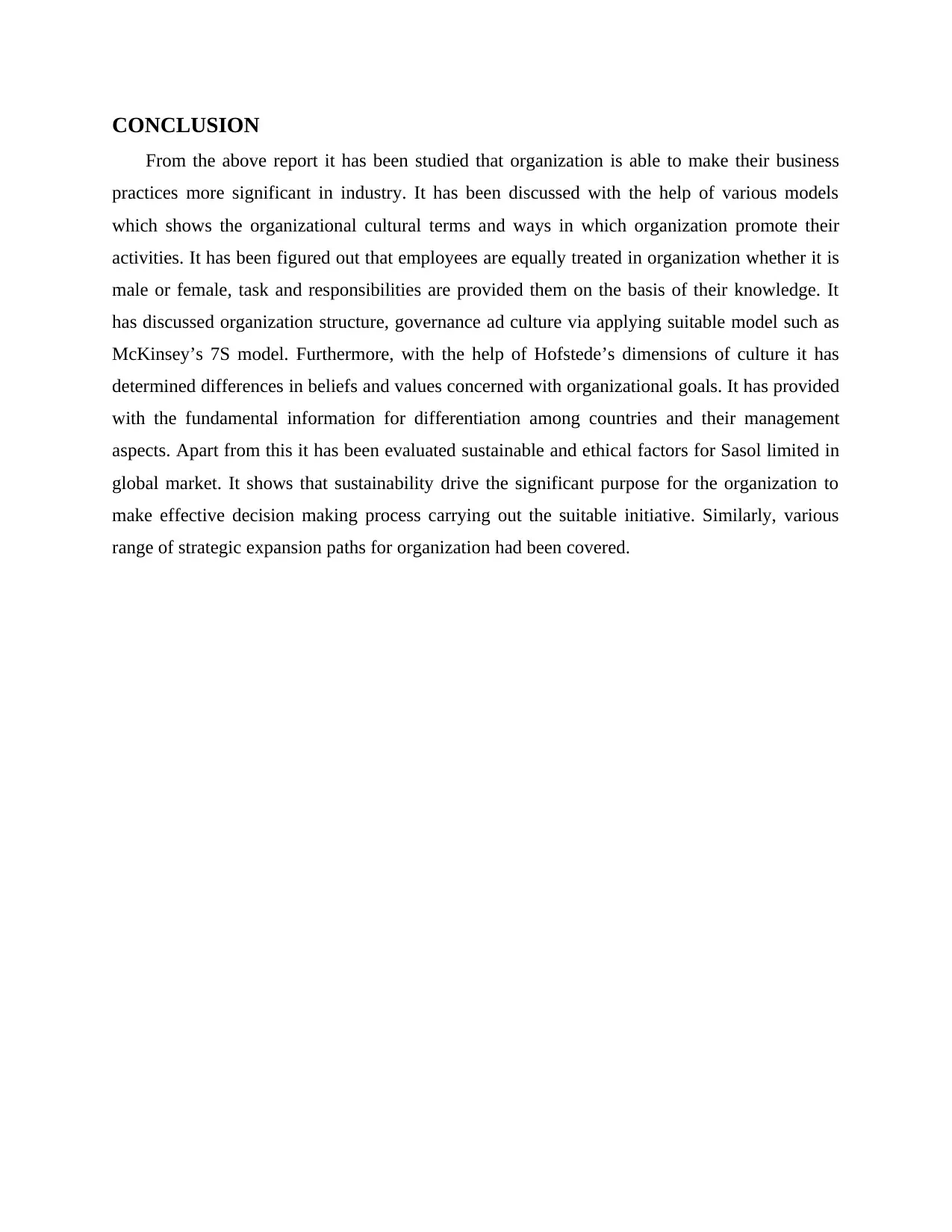
CONCLUSION
From the above report it has been studied that organization is able to make their business
practices more significant in industry. It has been discussed with the help of various models
which shows the organizational cultural terms and ways in which organization promote their
activities. It has been figured out that employees are equally treated in organization whether it is
male or female, task and responsibilities are provided them on the basis of their knowledge. It
has discussed organization structure, governance ad culture via applying suitable model such as
McKinsey’s 7S model. Furthermore, with the help of Hofstede’s dimensions of culture it has
determined differences in beliefs and values concerned with organizational goals. It has provided
with the fundamental information for differentiation among countries and their management
aspects. Apart from this it has been evaluated sustainable and ethical factors for Sasol limited in
global market. It shows that sustainability drive the significant purpose for the organization to
make effective decision making process carrying out the suitable initiative. Similarly, various
range of strategic expansion paths for organization had been covered.
From the above report it has been studied that organization is able to make their business
practices more significant in industry. It has been discussed with the help of various models
which shows the organizational cultural terms and ways in which organization promote their
activities. It has been figured out that employees are equally treated in organization whether it is
male or female, task and responsibilities are provided them on the basis of their knowledge. It
has discussed organization structure, governance ad culture via applying suitable model such as
McKinsey’s 7S model. Furthermore, with the help of Hofstede’s dimensions of culture it has
determined differences in beliefs and values concerned with organizational goals. It has provided
with the fundamental information for differentiation among countries and their management
aspects. Apart from this it has been evaluated sustainable and ethical factors for Sasol limited in
global market. It shows that sustainability drive the significant purpose for the organization to
make effective decision making process carrying out the suitable initiative. Similarly, various
range of strategic expansion paths for organization had been covered.
Paraphrase This Document
Need a fresh take? Get an instant paraphrase of this document with our AI Paraphraser
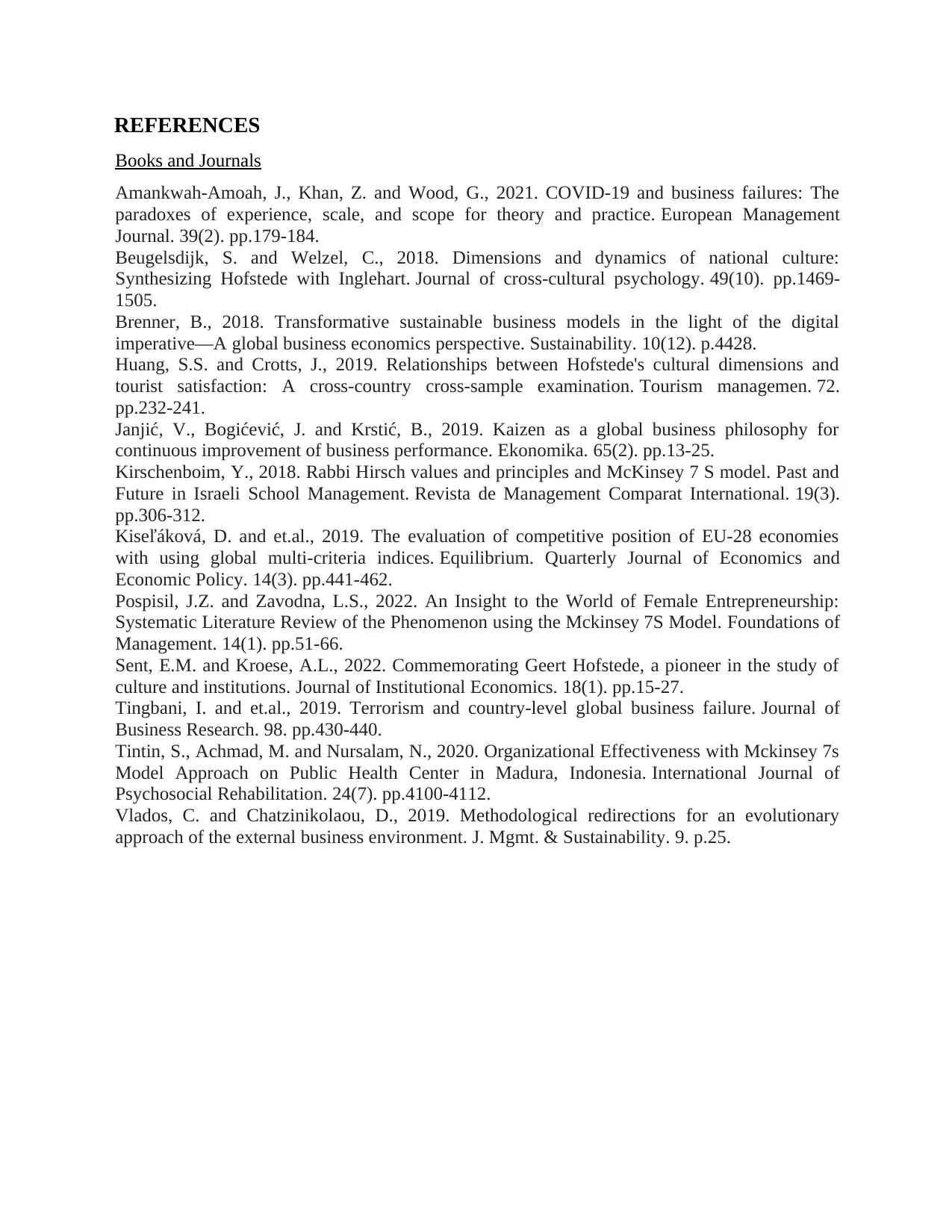
REFERENCES
Books and Journals
Amankwah-Amoah, J., Khan, Z. and Wood, G., 2021. COVID-19 and business failures: The
paradoxes of experience, scale, and scope for theory and practice. European Management
Journal. 39(2). pp.179-184.
Beugelsdijk, S. and Welzel, C., 2018. Dimensions and dynamics of national culture:
Synthesizing Hofstede with Inglehart. Journal of cross-cultural psychology. 49(10). pp.1469-
1505.
Brenner, B., 2018. Transformative sustainable business models in the light of the digital
imperative—A global business economics perspective. Sustainability. 10(12). p.4428.
Huang, S.S. and Crotts, J., 2019. Relationships between Hofstede's cultural dimensions and
tourist satisfaction: A cross-country cross-sample examination. Tourism managemen. 72.
pp.232-241.
Janjić, V., Bogićević, J. and Krstić, B., 2019. Kaizen as a global business philosophy for
continuous improvement of business performance. Ekonomika. 65(2). pp.13-25.
Kirschenboim, Y., 2018. Rabbi Hirsch values and principles and McKinsey 7 S model. Past and
Future in Israeli School Management. Revista de Management Comparat International. 19(3).
pp.306-312.
Kiseľáková, D. and et.al., 2019. The evaluation of competitive position of EU-28 economies
with using global multi-criteria indices. Equilibrium. Quarterly Journal of Economics and
Economic Policy. 14(3). pp.441-462.
Pospisil, J.Z. and Zavodna, L.S., 2022. An Insight to the World of Female Entrepreneurship:
Systematic Literature Review of the Phenomenon using the Mckinsey 7S Model. Foundations of
Management. 14(1). pp.51-66.
Sent, E.M. and Kroese, A.L., 2022. Commemorating Geert Hofstede, a pioneer in the study of
culture and institutions. Journal of Institutional Economics. 18(1). pp.15-27.
Tingbani, I. and et.al., 2019. Terrorism and country-level global business failure. Journal of
Business Research. 98. pp.430-440.
Tintin, S., Achmad, M. and Nursalam, N., 2020. Organizational Effectiveness with Mckinsey 7s
Model Approach on Public Health Center in Madura, Indonesia. International Journal of
Psychosocial Rehabilitation. 24(7). pp.4100-4112.
Vlados, C. and Chatzinikolaou, D., 2019. Methodological redirections for an evolutionary
approach of the external business environment. J. Mgmt. & Sustainability. 9. p.25.
Books and Journals
Amankwah-Amoah, J., Khan, Z. and Wood, G., 2021. COVID-19 and business failures: The
paradoxes of experience, scale, and scope for theory and practice. European Management
Journal. 39(2). pp.179-184.
Beugelsdijk, S. and Welzel, C., 2018. Dimensions and dynamics of national culture:
Synthesizing Hofstede with Inglehart. Journal of cross-cultural psychology. 49(10). pp.1469-
1505.
Brenner, B., 2018. Transformative sustainable business models in the light of the digital
imperative—A global business economics perspective. Sustainability. 10(12). p.4428.
Huang, S.S. and Crotts, J., 2019. Relationships between Hofstede's cultural dimensions and
tourist satisfaction: A cross-country cross-sample examination. Tourism managemen. 72.
pp.232-241.
Janjić, V., Bogićević, J. and Krstić, B., 2019. Kaizen as a global business philosophy for
continuous improvement of business performance. Ekonomika. 65(2). pp.13-25.
Kirschenboim, Y., 2018. Rabbi Hirsch values and principles and McKinsey 7 S model. Past and
Future in Israeli School Management. Revista de Management Comparat International. 19(3).
pp.306-312.
Kiseľáková, D. and et.al., 2019. The evaluation of competitive position of EU-28 economies
with using global multi-criteria indices. Equilibrium. Quarterly Journal of Economics and
Economic Policy. 14(3). pp.441-462.
Pospisil, J.Z. and Zavodna, L.S., 2022. An Insight to the World of Female Entrepreneurship:
Systematic Literature Review of the Phenomenon using the Mckinsey 7S Model. Foundations of
Management. 14(1). pp.51-66.
Sent, E.M. and Kroese, A.L., 2022. Commemorating Geert Hofstede, a pioneer in the study of
culture and institutions. Journal of Institutional Economics. 18(1). pp.15-27.
Tingbani, I. and et.al., 2019. Terrorism and country-level global business failure. Journal of
Business Research. 98. pp.430-440.
Tintin, S., Achmad, M. and Nursalam, N., 2020. Organizational Effectiveness with Mckinsey 7s
Model Approach on Public Health Center in Madura, Indonesia. International Journal of
Psychosocial Rehabilitation. 24(7). pp.4100-4112.
Vlados, C. and Chatzinikolaou, D., 2019. Methodological redirections for an evolutionary
approach of the external business environment. J. Mgmt. & Sustainability. 9. p.25.

⊘ This is a preview!⊘
Do you want full access?
Subscribe today to unlock all pages.

Trusted by 1+ million students worldwide
1 out of 13
Related Documents
Your All-in-One AI-Powered Toolkit for Academic Success.
+13062052269
info@desklib.com
Available 24*7 on WhatsApp / Email
![[object Object]](/_next/static/media/star-bottom.7253800d.svg)
Unlock your academic potential
Copyright © 2020–2026 A2Z Services. All Rights Reserved. Developed and managed by ZUCOL.



